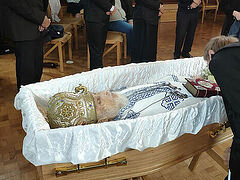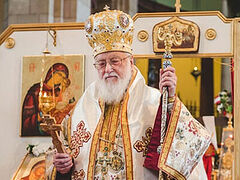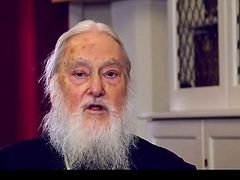Born in Moscow, Nun Seraphima (Konstantinovskaya) is a spiritual daughter of Archpriest Dimitry Smirnov who baptized her. At a young age, she moved with her family to the UK, where she met an outstanding theologian of our time, Metropolitan Kallistos (Ware) of Diokleia. Nun Seraphima became closely connected with Vladyka both in spiritual and academic life. In this interview, Mother Seraphima talked about what kind of person Vladyka was, how he chose love as the measure of everything, and how much he loved Russia.
—Tell us how you first met Metropolitan Kallistos.
—I’ve known Vladyka Kallistos for over thirty years. I remember his sermons from school. Our interaction initially was “from afar”, and for the past twenty years it was “close”, because all this time I have been in Oxford. My relations with Vladyka evolved both on the university (he was my teacher and scientific adviser), and the spiritual levels (he was my father-confessor). In the final months of his life, during his last illness, several people close to him, including myself, looked after him right until his death.
I remember our first meeting, which was about thirty-five years ago. Vladyka was giving a lecture in London (I don’t remember on what occasion and on what subject). But what stuck in my mind was his figure, his personality, his lively manner of speaking and that he spoke with a smile. He had been recently consecrated bishop—it was in the late 1980s. He stood out very much, striking everyone by his liveliness and brightness of words and thoughts. Vladyka had a great command of the word. Metropolitan Kallistos was a wonderful teacher because he was full of love for his students.
Vladyka had a rare gift—to explain complex things from Church history and theological thought simply and clearly. It was always a hallmark of his lectures. I recall that often in the introduction to a lecture Vladyka would often announce: “Three points should be singled out in today’s theme!” His lectures and talks were often built precisely around “three points”, not four or five. He loved this trinity.
Students sought to have him as their supervisor, because from the very beginning of work on someone’s thesis Vladyka would suggest a plan in which everything was clear and well structured. It was easy and exciting to work with Vladyka, and he was the most wonderful scientific adviser. He not only fulfulled his duties as a supervisor conscientiously, he also inspired, supported and encouraged his students tirelessly.

—What do you personally remember about Metropolitan Kallistos?
—Vladyka was always available and open for communication. It was easy to get an appointment with him because his heart was open to everyone. But at the same time, Vladyka loved order and you always needed to approach him first to agree on the day and hour of your meeting. It could take place at confession or in his office to discuss a research paper. He was always exceptionally punctual and accurate—whenever he agreed to talk for an hour, it was for an hour—not a minute less or more. Vladyka Kallistos had the gift of seeing and embracing a whole question and then breaking it down into its constituent points. Vladyka spoke about himself very modestly: “I am not an elder, I am a teacher.”
He was filled with love and was well disposed to all people. It is impossible to list how many people the metropolitan helped in difficult situations. Vladyka Kallistos helped me countless times. And he didn’t always talk about it. You could mention to him some situation, even a trivial problem with your scholarship, and he could write a letter to the right place. And suddenly your scholarship would appear, as if from nowhere. He did this in secret. Vladyka helped numerous people, and this speaks of his big heart, which was full of love for everyone. When advising others, Vladyka would often say: “You should always ask yourselves whether you are guided by love or not.” And this principle, which formed the basis of his instructions to others, guided his own actions. For him the fundamental criterion of actions and all life was love for God and his neighbor.
—Vladyka Kallistos was a very compassionate person.
—Many cases of his help to people are unknown, because Vladyka did not do it for show. Thus, Metropolitan Kallistos had a gift for helping people who had terrible academic misfortunes. For example: someone works on his doctoral thesis, completes it, gets ready to defend it and... he fails. His life’s work has been thwarted because he received a “black mark”, and the path to which he aspired has been closed to him.
The following incident happened to an Orthodox friend of ours. For several years she worked on her doctoral thesis—a comparison of M. Heidegger’s philosophy with St. Gregory of Nyssa’s theological thought—at one of the universities of southern England. On the day she was to defend her thesis it turned out that her examiner didn’t accept St. Gregory of Nyssa and hated Christianity! It was impossible to make him change his mind, since he regarded the theme of St. Gregory as a personal insult to his pagan and Marxist views. The defense was failed without a right of appeal. It had been the work of many years of her life. And Vladyka Kallistos saved the situation. He wrote to the dean of the department of that university, explaining that a terrible injustice had been committed; all the norms of freedom of academic thought had been violated, according to which, in such humanities as theology and philosophy, a person has a right to his point of view; that the work had been misread by the examiners; and that the Ph.D candidate had been personally insulted, which was unacceptable in an academic context. Vladyka’s intercession, coupled with his prayer, was successful. The candidate was given another chance. Metropolitan Kallistos himself acted as a new examiner and approved the thesis, writing a brilliant review. Justice prevailed, and without the slightest amendment to the text of the thesis the candidate was awarded a Ph.D. Thus, Vladyka defended not only the candidate, but also St. Gregory and Orthodoxy.
 Ceremony of conferring a Doctorate Degree Honoris causa to Met. Kallistos (Ware) of Diokleia. Source: the Orthodox Missionary Encyclopedia’s social media
Ceremony of conferring a Doctorate Degree Honoris causa to Met. Kallistos (Ware) of Diokleia. Source: the Orthodox Missionary Encyclopedia’s social media
—Vladyka Kallistos is an outstanding theologian of our era. How, in your opinion, did he change the contemporary Orthodox world?
—Vladyka was a remarkable theologian of our time, but he was also an outstanding academician. He was able to speak about Orthodox theology in a beautiful and at the same time accessible language. Speaking of the enormous contribution that he has made to the development of the twentieth century’s theology, we should especially emphasize his work on a collection of Greek ascetic texts known as the Philokalia: The Philokalia of the Neptic Fathers. The Greek word Philokalia means “love for the good and the beautiful.” This collection of Greek ascetic texts, written between the fourth and the fourteenth centuries, contains Patristic teaching on the ascetic enlightenment of the soul through the prayer of the heart, the acquisition of dispassion, and unceasing prayer through the Name of the Lord Jesus Christ.
The tradition of Philokalia thought runs throughout the development of Christian ascetic thought and practice. Having received a new golden age in the fourteenth and the fifteenth centuries, it was especially associated with the name of St. Gregory Palamas. By his teaching on unceasing prayer and the Uncreated Light, which a Christian who treads the path of the Gospel commandments, repentance and prayer strives to acquire already in this life, St. Gregory catalyzed a profound revival of Orthodox life not only in the Byzantine Empire, but also in the countries which were in the sphere of Byzantine influence—for example, in Russia. According to St. Gregory’s teaching, reflected in the texts of the Philokalia, unceasing prayer (according to the words of the apostle) and the enlightenment of the whole person are available not only to monks hidden from the world, but to Christians of any profession or geographical location. Vladyka Kallistos’ contribution is that he has conveyed this teaching, so necessary in the present age of global secularization and despair, to the modern Western English-speaking world.
—How did he do it?
—Over the span of several decades, Vladyka Kallistos and his assistants made an excellent translation from Greek into English of the texts of the Philokalia. The collection consists of five volumes. The first four volumes have long since been published (by Faber and Faber). The final, fifth volume, was delayed, and for some years the whole world was waiting for the completion of this wonderful project. One of Vladyka Kallistos’s most important achievements is that, during the months of his illness, he finished checking the translation of the last volume, and his assistants managed to finish checking all Biblical and patristic references. Thus, today it is possible to sum up the most important work of Metropolitan Kallistos’s life and say that the whole project was completed by him. We look forward to the publication of the fifth volume in the coming months.
—What have we lost with Vladyka’s repose?
—We have lost a friend, a father-confessor, and a mentor. There is a strong feeling of emptiness after his death. During the last months and weeks of Vladyka’s life, the lives of those who looked after him were filled with concern for him. No matter whether you were close to Vladyka in his final days or knew and loved him at a distance, we can unmistakably say that now everyone who knew him humanly feels sorrow. We have lost his living presence with us and his living word. We can’t have a conversation with him anymore, or come to him for confession. You can no longer go on a pilgrimage with Vladyka (he was an avid traveler—he knew and visited holy places all over the world). And never again will he celebrate the Liturgy here on earth.
Nevertheless, although he has passed away, after his death there remains the sense of joy and peace that comes when someone has a blessed repose. Vladyka Kallistos had a blessed repose, full of prayer and grace. And many people know that he hasn’t left us—he is with us.
His word will grow and nourish people around the globe. It is probably not until someone passes into eternity that we begin to realize and truly appreciate the value of his contribution and the influence of his word in Christendom.
—Although Vladyka belonged to the Greek Church, he loved the Russian Church as well.
—He knew the holy places of Russia very well, and loved and appreciated Russia and its holy places. He knew Russian culture and art and could have been a guide in the Tretyakov Gallery. He remembered the exact location of one or another icon or painting in the gallery!
Vladyka nurtured whole generations of Orthodox theologians and clergy, many of whom were his students. One of his most beloved students was Metropolitan Hilarion (Alfeyev). It seems providential that Vladyka Hilarion was with him in the final days of his earthly life. It was Vladyka Hilarion who celebrated the last Divine Liturgy in the earthly life of Metropolitan Kallistos. He also performed the first memorial service for Vladyka just minutes after his repose.
Give rest, O Lord, to the soul of Thy departed servant, our father and teacher, Metropolitan Kallistos!






